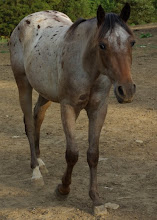Lately I'm finding an astounding number of senior horse owners (that's people who own senior horses)...who really, honestly, don't know HOW to care for their aging companion. It's sad and it's scary. Older horses don't do well tossed out to pasture for the winter to fend for themselves. Older horses have been there, done that, earned their keep for years, taught owners how to ride and babysat their owners' children - they deserve true 'Golden Years'.
There are many simple steps you can take toward helping make your older horse more comfortable and healthy, and most of them will cost you less money in the long run -- most of it is just basic care!
As a horse ages, especially if he is essentially retired and not ridden/exercised on a regular basis, he will lose some muscle tone - much like an older person starts to "shrink" - it's not uncommon for an older horse's back to start to droop and hindquarters to look less filled out than in the younger years. But there's a difference between loss of muscle tone and loss of overall weight and condition. Age is NOT an excuse for a horse to be thin, period.
If you can see ribs, tailbone, and spinal bones - your horse is too thin. What are some things you can do to maintain his weight in his golden years?
- Have his teeth floated annually - have the vet do teeth at the same time he comes out to do vaccinations and pull Coggins. Horses wear their teeth constantly over their lives - many develop sharp points that make chewing and processing food difficult. This annual 'dentist' visit will also help you keep track of how many molars your old buddy has left - helping determine when you might need to make a feed change. If you notice lots of dropped feed, or wads of grass/hay that have been partially chewed - those are both huge signs your horse needs his teeth floated. (Just to note, there are equine dentists out there who specialize in taking care of horses' teeth! Not all vets are qualified to deal with serious dental issues!)
-Which leads to...make the switch to a senior feed BEFORE your older horse starts losing weight. Most feed makers say around age 15, but really, any age horse can benefit from senior feed if they have a low-weight problem. The benefits of senior feed include - it is a complete feed, meaning if your horse can't chew and digest hay, he still gets all the fiber and nutriens he needs from his feed. Also, senior feeds are softer and easier to digest than 'sweet' feeds and other pelleted feeds. You can add water to it to make a mash that's even easier for your horse to eat. Many of the senior feeds on the market also include probiotics for digestion, beet pulp for fiber, omega 3 and 6 oils for skin, coat, and joint health, and biotin for healthy hooves - so in the long run, you save money on supplements, too. When you look at the cost of a bag of sweet feed - and the amount you might have to feed for Ole Bones to keep weight on - you save money in the long run by spending the extra $2-$4 per bag buying the senior feed.
-Just as you do with younger horses, make sure your older horse is on a consistant deworming schedule. Rotate by ingredient, not brand name. Deworm for tapeworms spring and fall with Equimax or Zimectrin Gold, and use other products as recommended by your vet or the rotation on the front page of this site throughout the year.
-Yes, some older horses will need to be fed seperately from the herd. It may take them longer to eat. Be prepared for this, and keep stalled/seperated overnight if necessary to give access to all their feed. In general, I am not an advocate of stalling and blanketing 'just because a horse is old'. I've had horses that would stand in the snow in front of the barn when given the choice where to be in the winter - but you DO need to provide your oldster with at least a run-in, 3-sided shed, or some type of shelter where he can get out of the worst of the weather - especially frigid winds up north and ice storms farther south.
-There ARE hay replacers out there if your old timer can no longer chew regular hay. Alfalfa cubes or alfalfa/timothy cubes soaked until they are mush, soaked beet pulp, soaked hay replacer pellets, or chopped 'dengie' hay, are all options. Visit your local feed store and check into your options.
-A cheap, easy way to put on weight is to add fat to the diet. Soybean oil, corn oil, or 'vegetable oil', fed 1/4 to 1 cup per day, is an old standby for many horsemen.
There are a great many products on the market in feed stores for 'hard keepers' or 'senior horses' - what works for one doesn't work for all. Start with the simple - teeth, deworming schedule, senior feed - and go from there. It is easy for a horse to lose weight - it can take weeks or months to return a horse to a healthy weight that's lost a lot. The easiest solution is to keep the weight on in the first place!
Subscribe to:
Post Comments (Atom)

No comments:
Post a Comment